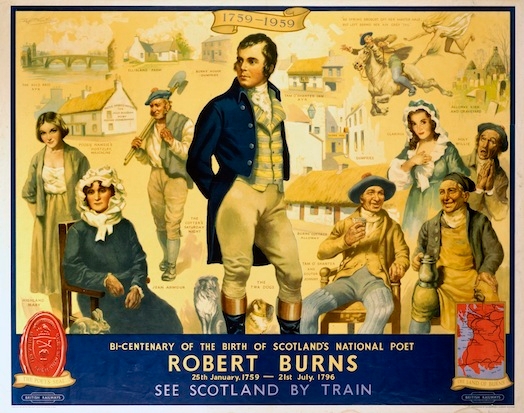As a life, it was a scintillating spectrum of the human condition. There was hardship and suffering, as well as laughter and fun, plus a great deal of sex, mostly extra-canonical. There were large, even universal perspectives, but also a fey and complex personality which did not sit easily with coherence. That may explain why no biographer has come close to doing him justice. This was a great man, always overshadowed by a weakened constitution and by social insecurity. His high talent was recognised as soon as he was published. Had he been a less restless, more accommodating personality, he could have settled down in the library of an aristocratic house, funded by some patron happy to secure his own immortality by serving as a grub in amber. There might have been several more decades and many more verses.
But that would not have been Robert Burns. He was too turbulent, too stravaging — and anyway, death had been stalking him for years. In our naivety, we are inclined to attribute completion to some geniuses who died young — Raphael, Mozart — because we cannot imagine how they could have equalled, let alone surpassed, their masterpieces. They could. There is a second group whose mastery is unsurpassable, but oh for many more examples: Masaccio, Giorgione. Finally, there are others whose incompleteness is a constant source of regret. Carel Fabritius, Keats and Schubert are obvious examples, all struck down while still mastering their craft; the glories that they left us a mere fragment of what might have been.
Even though only the most bigoted of Scotsmen could claim that Burns was a master of the very first rank, he rates high in the battle honours of the tragically incomplete. I do not want to insult my readers, but I have met Englishmen who regard themselves as educated and pass as such in society, but who had not read ‘Holy Willie’s Prayer’ or ‘Tam o’ Shanter’. If you should know any such person, tell him that pleasure awaits.
So does the Burns Night season. A few years ago, tasked with delivering the Immortal Memory, I asked Cecil Parkinson if he could think of a clean joke with a Burns theme. He did. In recent times, the entry criteria into heaven were relaxed. As a result, some English and some Scottish football supporters arrived in the same conveyance, and started fighting. News reached the Almighty, who summoned them for an interview without ambrosia. ‘I’m not going to put up with this for the rest of time. I gather you were arguing as to which of your nations is the top dog. Well, you’ll resolve that dispute now and for all eternity. I would suggest football, but there aren’t 11 a side and I’m certainly not letting any more of you lot in. So both groups, nominate a poet.’ The Scots chose Burns, the English, Wordsworth. And God said: ‘You two have 20 minutes to produce a four-line poem, including the word Timbuktu, rhyming.’
It took Wordsworth no time at all, which depressed the Scots, for it sounded awfully poetic. ‘I went unto a foreign land/ I came upon a silver strand/ A sailing ship hove into view/ Her destination, Timbuktu.’ But like Blucher, Rabbie arrived late and saved the day. ‘Tim and I a’walking went/ We spied three virgins in a tent/ Since they were three and we were two/ I bucked one and Tim buck’d two.’
Ranald MacDonald of Clanranald, whose lineage is as old as Scotland, has been celebrated in these pages before. The other night he gave a dinner which was an aperitif to Burns Night. The pièce de résistance was not haggis, but recycled vegetable in the form of grass-fed Aberdeenshire beef, which had been hung for 38 days, and cooked sensitively, so that one’s palate sang with blood. What to drink with such a feast, and with haggis? That will have to await my next column, perhaps with some further animadversions on Burns.






Comments